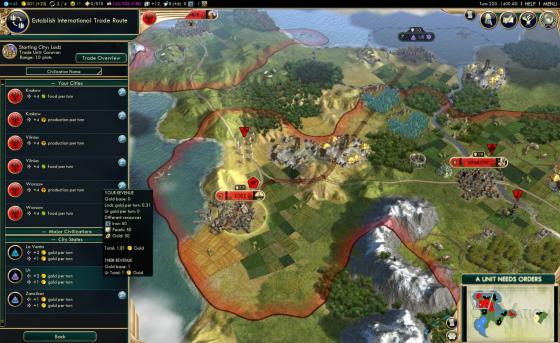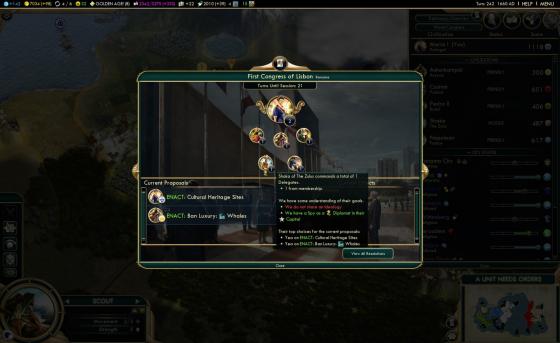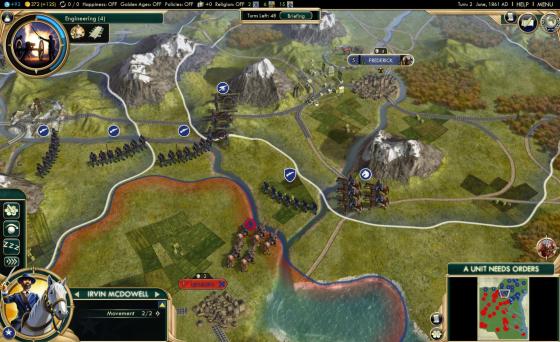
Sid Meier's Civilization V: Brave New World Review
Sid Meier's Civilization V has consistently provided an intriguing mix of old fashioned and modern post-launch content. While small DLC like civ and map packs have trickled out over the years, Firaxis have now also released a total of two larger expansions. Last year's Gods and Kings was a good addition to the game that implemented some must have game elements, as well as some fun scenarios. This year's expansion, Brave New World, looks to do the same.
One of the big new features this time round is the all new cultural victory, which essentially eradicates the previous culture strategy and implements a bunch of new features that will help you gain influence over your rivals. That's the aim of this new victory method: building up culture and completing social policy paths is no longer the key to victory. Instead you must make your civ the centre of world culture by housing great works, spreading your religion and extending your trade routes to all corners of the globe. It's a far more developed system that takes even more concentration and effort than a domination victory. Thankfully, a lot of the new elements introduced alongside the new culture system are great fun.

Perhaps the most important part of the new culture victory is the concept of tourism. Tourism is used to spread your influence and is made up of great works that your great artists, musicians and writers can create. Essentially, the higher your tourism, the quicker your culture becomes more dominant in other civs. Of course, those are just the basics; the details of the tourism system are fun to play around with and while a little daunting at first (especially considering the lack of properly helpful tips), it's one of the most strategic concepts to be added to the game yet.
With each cultural building (museums, Oxford University, broadcast towers) you can store a certain number and type of great works, with each one adding +1 to your tourism. It's a simple start, but the complexity comes from the fact that putting certain works in certain buildings earns you bonus tourism points. For example, having two works of art from different time periods in a museum grants you an extra +2 tourism on top of your great works. This is then furthered by the fact that you gain more bonuses for having works from different civilisations. To access these you must trade great works with the other civs in an effort to gain big bonuses to your tourism.

There are other little details, like the ability to use archeologists later in the game to dig up old great works, as well as policies that modify your tourism output. They all come together to form a cultural victory condition that's great to aim for at the beginning, as it requires not just one resource, but rather a combination of different elements. Spreading your religion is important for increasing influence, so faith has to be considered. The new trade routes allow you to do this, as well as gain money, and keeping track of them is fun. This is then all taken to the next level by the time you reach the late industrial and early modern age with the introduction of the World Congress, the other big addition of Brave New World.
The World Congress mechanic aims to fix the issues with Civilization V's late game, notably the fact that you've usually either already won or lost by the modern era, so the rest is only a formality. The World Congress comes into force when enough players enter the industrial era (or one player enters the modern era) and has a voting system in which each civ has a certain number of delegates based on various factors. Balancing these factors is where the strategy comes in. Much like the United Nations before Brave New World, allying with city states is the best way to gain extra delegates, and therefore power. Actually hosting the congress also grants you a delegate bonus, as do some wonders, but having control over the city states is the best way to hold court.

The Congress chooses and votes on propositions that range from blockading an entire civ to setting up a World Trade Fair. All of the propositions have consequences and will work in favour or against certain civs, hence the choice to approve or reject them. In of itself it's a good system that introduces a great sense of tactical play within the once dull endgame. My only issue with the Congress is that it's only too easy for the richest civ to buy the alliance of the majority of city states and therefore have a game winning influence within the World Congress. In fact, it was through this method that I won a game through diplomatic victory despite being far behind one of the other civs. In theory the others could band together to prevent this, but I never saw it happen.
So the big changes to the actual gameplay are mostly great; they're certainly fun if lacking a little in balance. However, there's still a decent supply of less significant content to check out. The two scenarios on offer are a mixed bag. The American Civil War scenario is pretty bad; essentially a military focused game in which you can lead one of the two sides to victory. The start locations are poorly chosen, the research is almost pointless and the lack of unit variety makes combat boring, which in a combat focused scenario is a deal breaker. Thankfully, the scramble for Africa scenario levels the field as it manages to be both fun and strategic. It features a good use of some of the new gameplay mechanics and focuses on exploration and development over combat. It's a surprisingly good scenario that acts as a nice side track to the main game.

The new factions are pretty similar to the current ones; with so many civs in the game by this point, they're becoming less and less distinctive, but there's no denying the coolness of playing as the Zulu. The only civ of real recognition is Venice, who can not build or capture any cities but rather act as a centre for culture and trade through double trade routes, much like the real historical Venice. There are also some new units and wonders to try out which helps to fill out the game even further.
Brave New World is a great conclusion to a great game, in more ways than one. Not only is this an expansion that deals with the once drab Civilization V endgame, it's also fitting for what is probably the final large expansion for the game. The expansion adds a really interesting and fun victory condition, some good changes to basic mechanics as well as a decent array of new content. Of course, it's not all good; a bad scenario plus missable content highlight this, and the asking price is a little on the steep side. Overall though, this is an expansion that veteran players in particular should check out. It's deep, fun and I can no longer imagine playing a game of Civilization without it.
Sid Meier's Civilization V (Reviewed on Windows)
This game is great, with minimal or no negatives.
Overall though, this is an expansion that veteran players in particular should check out. It's deep, fun and I can no longer imagine playing a game of Civilization without it.











COMMENTS